"According to the Open Net Initiative, more than 620 million Internet users—31% of the world’s total Internet users—live in countries where there is substantial or pervasive filtering of online content." - Bob Boorstin, Director of Public Policy, Google
Dragonfly
Image by Rezwan
The World Cup Goal-E Project
This street in Bangladesh has a colorful world cup celebration
New Chum Hill Ruins
Remnants of Kiandra gold mine at New Chum Hill, #nsw #australia
May 27, 2012
May 24, 2012
Bangladesh: Using Blogging to Expose ‘Eve Teasing'
Thursday, May 24, 2012
No comments
This post was written in Bangla by Bijoy and was translated for Global Voices Online by Rezwan
Eve teasing(sexual harassment of women) is one of the major problems in Bangladesh which many women face everyday. This social problem exists everywhere be it in rural or in urban areas. One of the main reasons of girls being married off at an early age or them dropping out of school is “eve
teasing”. Many times these incidents lead to violence and even deaths.
There had been instances of parents or siblings giving their lives to stop “eve teasing”.
Strict laws and regulations cannot deter these incidents from happening. Sometimes the harassers get away because of the silence of the society. Recently in the capital Dhaka, a blogger has taken a strong stance against the perpetrators of an “eve teasing” incident and he asked the help of other bloggers to unmask the identity of these violators.
On 11 May, 2012, Sorbonasha, an anonymous blogger, wrote a post titled ‘At this moment I am seeking help of thousands of bloggers from somewhereinblog.net (blogging platform) … right now‘[bn].
Then he described an “eve teasing” incident:
The post was widely read (43,839 times at the time of writing the post) and many people commented on it (1062 comments).
Shafiul Alam [bn] commented that he will be able to help in finding their identity.
Headsir[bn] says:
Zia Chowdhury [bn] said:
While some commented in the blog post that the anonymous blogger reacted dramatically, most of them did not negate the incident as it sadly happens in Bangladesh.
The bloggers meeting, ULAB's statement, and the subsequent discussion of the bloggers with the administration involved common concern of how to nab the perpetrators. But after all these the boys are still to be identified. Nonetheless, one blogger raised his voice against one crime and thousand voices echoed to support him.
Strict laws and regulations cannot deter these incidents from happening. Sometimes the harassers get away because of the silence of the society. Recently in the capital Dhaka, a blogger has taken a strong stance against the perpetrators of an “eve teasing” incident and he asked the help of other bloggers to unmask the identity of these violators.
On 11 May, 2012, Sorbonasha, an anonymous blogger, wrote a post titled ‘At this moment I am seeking help of thousands of bloggers from somewhereinblog.net (blogging platform) … right now‘[bn].
Then he described an “eve teasing” incident:
I was standing on road 5/A of Dhanmondi, on the main road opposite Medinova (medical center). It was almost 9:50PM at night. Suddenly I saw some young lad walking towards the Star Kabab and Restaurant. There One girl was trying to hire a CNG Autorickshaw. The boys were younger than that girl, however, one of them slipped his hand on to her tops and pulled her pant down from behind… then they continued walking laughing. In a state of sudden shock, the girl stood perplexed, harassed, she did not have anything to say in shame.Then he described how he fought for her [bn]:
I could not tolerate it anymore. I ran towards the boys and protested. They immediately attacked me. I was greeted with punches, kicks and slaps. I called for help and they identified themselves as the students of University of Liberal Arts Of Bangladesh (ULAB). They tried to pull me towards their campus. The girl now was in tears trying to help me and was crying for help. Many people had gathered by then. When they asked I described what happened with herHowever the blogger was surprised to see that many were advocating for the perpetrators instead of the victims [bn]:
I noticed that the students of ULAB, the cigarette sellers, the chauffeurs of some students were advocating for the boys. They were trying to say that perhaps they had done a mistake, ut I should not exaggerate it as these can happen. Some also advised me to leave the place immediately without causing much trouble. I noticed a large section of people standing there silent, watching inactively. Let alone defending me, nobody was even protesting the incident.But the blogger did not stop there. After reaching home he wrote a blogpost trying to identify those boys. He proposed some steps including a blogger's meeting. In his post he asked the netizens to help him expose the real identity of those involved in that harassment.
The post was widely read (43,839 times at the time of writing the post) and many people commented on it (1062 comments).
Shafiul Alam [bn] commented that he will be able to help in finding their identity.
I could say many thing, but cannot because of some problems. I know many people of that area and have contacts in ULAB. If those boys are students of that institution, I think I will be able to find out.Nostalgic [bn] is angry to learn about this incident. But he is hopeful seeing the protest of the blogger:
I felt awful reading it. I admire your courage. We have not all become passive bystanders. Still there are people like you who stand alone from the crowd trying to protest.Birendra [bn] tells why these criminals should be punished:
This shows degradation of morals in the society. Many many thanks to you for your protest. If these people are punished we can expect a decrease in such crimes.Sajid[bn] commented that these kinds of problems can be solved through everybody's help:
Salute to you. Nobody can do it alone if people do not rise.Ashikur Rahman Amit[bn] was angry to see bystanders doing nothing:
Where have our morals gone? I feels ashamed to express even my hatred towards those animals of ULAB. I condemn those who did not come forward to protest.Noman Mir [bn] lauded the courage of the anonymous blogger:
I salute your humanity and courage. You should not stop and should go forward. We are with you.Kangal Murshid[bn] has expressed his support in this initiative from afar. He also expresses his concerns:
I cant thank you much – I support you in all your steps. I live in Chittagong, so I cannot join you in person. Please go forward, people with conscience will be with you. But one small request, dont let this turn into a political issue.The blogger did not limit this campaign online, he called [bn] a meeting offline to help in this cause.
I call every blogger, online activist and anyone interested in this cause to a bloggers meeting:Many expressed interest to be in that meeting. The ULAB authority also posted a comment on the blog [bn]:
Proposed date: 13th of May 2012
Proposed Time: 08:15 PM
Proposed venue: TSC square, Dhaka University
The ULAB authority took notice of the incident cited in your blog which indicates that some students of this institution was involved. It happened near to the campus and we regret and condemn such incident. We express our wholehearted compassion and sympathy for the victims. This is really unfortunate that in our society our mothers and sisters are not safe from these sadists. As an institute for higher education the ULAB administration always takes a firm stand against such crimes.In the statement the institution expressed their support in the investigation [bn].
ULAB has started their own investigation on this. We have already tried to contact the anonymous blogger with the help of Somewhereinblog authorities. To expedite the investigation and ensure accuracy we would request him to contact us directly. We express our full support for the victims.Many commented on this statement and some did not support this kind of internal investigation
Headsir[bn] says:
Everything is ok. Where is the guarantee that the investigation committee will reveal the truth? To keep the goodwill of the institution untainted they will try to bury this incident.Konad [bn] says:
If we let the investigation the hands of the ULAB administration then the real criminals will never be exposed. And all perpetrators may not be from this institution. So we have to keep our search efforts running.But many praised the stance of the ULAB authorities:
Zia Chowdhury [bn] said:
I congratulate the ULAB administration. Now the students of the Institution should come forward to expose these culprits.After the first statement the ULAB administration posted an update on the steps taken by them.
While some commented in the blog post that the anonymous blogger reacted dramatically, most of them did not negate the incident as it sadly happens in Bangladesh.
The bloggers meeting, ULAB's statement, and the subsequent discussion of the bloggers with the administration involved common concern of how to nab the perpetrators. But after all these the boys are still to be identified. Nonetheless, one blogger raised his voice against one crime and thousand voices echoed to support him.
May 16, 2012
India: Crackdown on Tamil Nadu Anti-Nuclear Plant Protests
Wednesday, May 16, 2012
No comments
This post was first published in Global Voices Online.
Concerns have been sparked that the Kudankulam Nuclear Power Project (KKNPP) currently under construction in the Tirunelveli district of Tamil Nadu, India, may have similar vulnerabilities to the ill-fated Fukushima nuclear power plant of Japan. Activists fear that in the case of an earthquake followed by a tsunami in the Indian Ocean, there could be an accident similar to the radiation leak at the Japanese coastal nuclear plant last year.
Construction started more than a decade ago and KKNPP is expected to be in operation soon. S. P. Udayakumar of the voluntary organisation ‘People's Movement Against Nuclear Energy' (PMANE) lists 13 reasons why the activists and locals do not want the power plant to start. He stress that:
Protest and arrests:
Shedding a light onto the government crackdown on the protesters, Kracktivist cites:
The protests continued as the ‘People’s Movement Against Nuclear Energy' (PMANE) recently launched three campaigns against the Kudankulam Nuclear power Plant, reports Kracktivist:
According to a press release, “The People’s Movement Against Nuclear Energy (PMANE) called off the planned event at Idinthakarai on May 10, 2012 as the District authorities have clamped down prohibitory orders such as 144 in and around Kudankulam area”.
However, some 9,000 people still participated in a sit in, with several hundred on an indefinite fast. The hunger strike has been going on since last month. DiaNuke/Aam Janata has posted some pictures from Kudankulam which depicts women on hunger strike and villagers living under constant fear.
The Chief Minister of Tamil Nadu, Ms. Jayalalithaa, has vowed that the plant will start to function soon. Anuj Wankhede at DiaNuke invited a debate with Dr. M R Srinivasan, the former chief of India’s Atomic Energy Commission on whether the Kudankulam reactors are really the “safest in the world”, as claimed by the authorities.
The anti-Kudankulam activists are willing to end their protest if the government meets their demands.
Concerns have been sparked that the Kudankulam Nuclear Power Project (KKNPP) currently under construction in the Tirunelveli district of Tamil Nadu, India, may have similar vulnerabilities to the ill-fated Fukushima nuclear power plant of Japan. Activists fear that in the case of an earthquake followed by a tsunami in the Indian Ocean, there could be an accident similar to the radiation leak at the Japanese coastal nuclear plant last year.
Construction started more than a decade ago and KKNPP is expected to be in operation soon. S. P. Udayakumar of the voluntary organisation ‘People's Movement Against Nuclear Energy' (PMANE) lists 13 reasons why the activists and locals do not want the power plant to start. He stress that:
More than 1 million people live within the 30 km radius of the KKNPP which far exceeds the AERB (Atomic Energy Regulatory Board) stipulations. It is quite impossible to evacuate this many people quickly and efficiently in case of a nuclear disaster at Koodankulam.
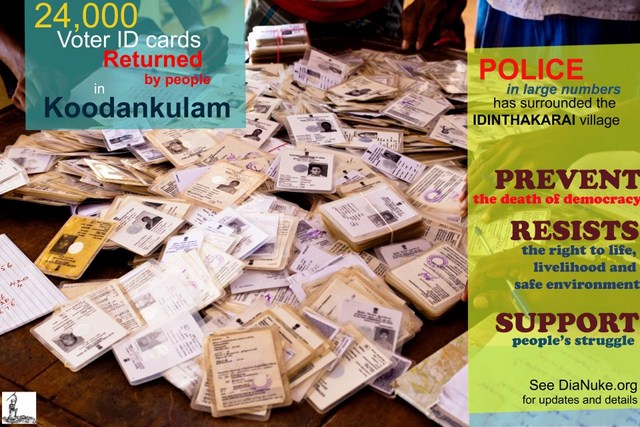 |
| Protest campaign against Koodankulam Nuclear Power Plant. Image courtesy Kracktivist, used with permission. |
Shedding a light onto the government crackdown on the protesters, Kracktivist cites:
Between 10.9.2011 and 23.12.2011, police had filed 107 FIRs (field investigation reports) against 55795 people and “others,” among whom 6800 have been charged with “sedition” and/ or “waging war against the State.”In March 2012, police arrested approximately 200 anti-nuclear protesters objecting the resumption of work on one of the two 1 GW (gigawatt=1000 megawatt) reactors, a day after the local government restarted work on the project. A Public Interest Litigation (PIL) has also been filed against KKNPP at India's Supreme Court. Amnesty International has written a letter to the Prime Minister expressing their dismay on the detainment of the protesters. However, there were also rallies and protests in favor of commissioning the nuclear power plant.
The protests continued as the ‘People’s Movement Against Nuclear Energy' (PMANE) recently launched three campaigns against the Kudankulam Nuclear power Plant, reports Kracktivist:
Collection of signatures by villagers who oppose the nuclear plant and surrender of voter identity cards will be observed in 60 villages belonging to three neighboring districts while [a] ‘respect India’ campaign will be observed throughout the country.On May 9, around 23,000 people belonging to nine villages in Tamil Nadu surrendered their voter identity cards to draw attention to the continuing ignorance of the peaceful protest against the KNPP. The government did not take it lightly; Kracktivist also reported that thousands of police personnel were deployed near Idinthakarai village and a crackdown seemed likely.
According to a press release, “The People’s Movement Against Nuclear Energy (PMANE) called off the planned event at Idinthakarai on May 10, 2012 as the District authorities have clamped down prohibitory orders such as 144 in and around Kudankulam area”.
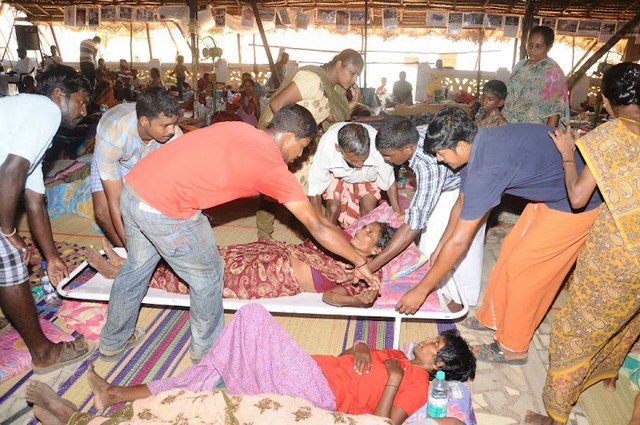 |
| Protesters on hunger strike. Image courtesy DiaNuke/Aaam Janata, used with permission. |
The Chief Minister of Tamil Nadu, Ms. Jayalalithaa, has vowed that the plant will start to function soon. Anuj Wankhede at DiaNuke invited a debate with Dr. M R Srinivasan, the former chief of India’s Atomic Energy Commission on whether the Kudankulam reactors are really the “safest in the world”, as claimed by the authorities.
The anti-Kudankulam activists are willing to end their protest if the government meets their demands.
May 09, 2012
Bangladesh: Movie Theaters Are Dying
Wednesday, May 09, 2012
No comments
This post was written in Bangla by Pantha Rahman Reza and translated for Global Voices Online by Rezwan
Watching movies in theaters was once a favorite pastime for
Bengalis. The custom was to go to the movies on the holidays or special
days. It was popular culture to follow the fashion and postures of the
stars of the new released cinemas.
But cinema-loving Bengalis do not go to movie theaters nowadays and the country's cinema halls are closing one by one, as new shopping malls are being erected in their place. According to reports in the past decade, hundreds of cinema halls have been closed down [bn]. There also used to be approximately 100 cinemas built each year, which has now decreased to 30-40 [bn].
Darashiko blogs on cinema regularly. Here he shares the latest state of the Bangladeshi film industry [bn]:
A guest blogger at Sachalayatan reminisces about his childhood memories of going to cinemas with family. The blogger blames the film distributors for lack of viewers in movie theaters:
Nazrul Islam says in a post in Amrabondhu blog:
One blogger (Fahmidul Haque) says:
Kallol Mustafa has specific suggestions on how to revive the local film industry:
But cinema-loving Bengalis do not go to movie theaters nowadays and the country's cinema halls are closing one by one, as new shopping malls are being erected in their place. According to reports in the past decade, hundreds of cinema halls have been closed down [bn]. There also used to be approximately 100 cinemas built each year, which has now decreased to 30-40 [bn].
Darashiko blogs on cinema regularly. Here he shares the latest state of the Bangladeshi film industry [bn]:
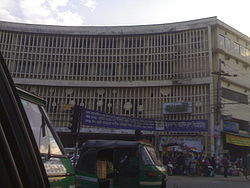 |
| Shyamoli Cinema Hall is just a memory. A 14-story shopping mall is being built in its place. Image courtesy Wikipedia |
The Bangladeshi cinema industry is going through its worst time. In 1990-91 the number of cinema halls were around 1230. But in 2010 the number has decreased to 742. Out of 44 cinema halls in Dhaka 33 are surviving. Huge building were erected in their place. Big names like, Gulistan, Shyamoli, Naz, Lion, Star, Shabistan, Tajmahal cinema etc. went into oblivion. With Lack of quality script and mediocre performance the cinema industry managed releasing of 100 movies per annum. In 2010 the number was 63, one of the lowest in the decade. Its getting much worse. In 2011, in first six months only 19 cinemas were released and only 300 million Taka (US $3.6 million) was invested. Newspaper reports say that this year only 45 films will be produced and the next year it would be only 30.But why are movie theaters being closed down? Why are audiences not going to movie theaters? Megh Roddur writes [bn] about it:
Of course I want to go to the movie theaters to watch movies. It hurts but the truth is that most of the movies are not of my taste. Why should I watch a movie full of weird costumes and blunt themes. Why should I go and watch repeating stories? Why should I go and watch copycats and gross copypaste movies?
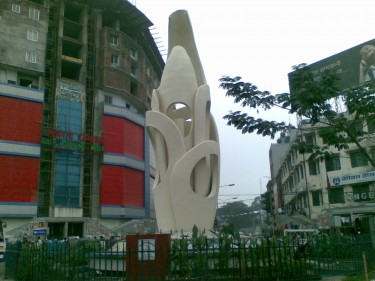 |
| The building behind the sculpture was once the famous Gulistan Cinema Hall. Now its a clothes market. Image by Ranadipam Basu. Used with permission. |
Now we don't watch movies in Theaters with family. I would not blame low quality pictures. I would place the blame on the environment of the movie theaters. There are a few good movies still being produced. Still we cannot go with the family to watch them in this environment.Lekhajoka Shamim cites three reasons for the demise of this industry:
The low quality of the local cinema, indecent movies and the environment of the movie thater are the causes of lack of movie viewers.Once the thought of going to movie theaters was an exciting thing. Many had keen interest. Russel Ashraf tells one such story:
Me and my uncle went to see the movie “Aguner Poroshmoni”. We thought that there would be no rush and went a few minutes before the start. But alas, we saw that the queue was extended to the road. What to do! Waited in the queue for the tickets and manged a seat in front of the screen. I could not move my neck for three days in pain.To save the film industry and bring more viewers in movie theaters, the government decided to remove the ban on Indian cinema (it should be noted that Indian movies have been banned here since 1965). This move attracted sharp criticisms online.
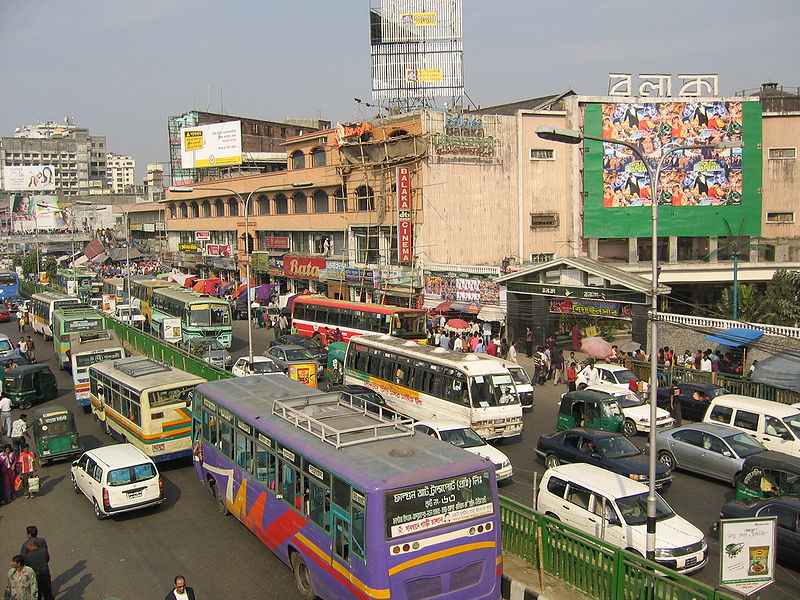 |
| Balaka cinema hall besides Dhaka New market. Image from Wikipedia by Ragib Hasan |
Not from the hatred of Hindi language films, the government has to back down from such wretched decision to save a dying industry.।But there are also those who favor import of movies:
One blogger (Fahmidul Haque) says:
To me its a right of a citizen to be able to watch local and international movies of different tastes. Lets not limit this right with the debate of saving of local industry by stopping the import of Indian movies.Due to much criticism the government decided to reverse the decision to withdraw ban from the Indian movies.
Kallol Mustafa has specific suggestions on how to revive the local film industry:
We need government institution support, financial responsibility, institutionalization of the industry and mandatory show of international movies (not only Indian) in a week each month in every theater.
May 06, 2012
India: Freedom Fast To Save Your Voice
Sunday, May 06, 2012
No comments
The protests to stop the new IT rules in India (see our previous post on this) are still going on. Today is the fifth day of the hunger strike of Aseem Trivedi and Alok Dixit from Save Your Voice
to support annulment motion against IT Rules-2011 in Rajya Sabha. They
started this hunger strike on the 2nd of May and vowed to carry on until
they get any satisfactory response from the government and the
opposition regarding the annulment of IT Rules-2011. Sh. P. Rajeev, the
Hon’ble Member of the Rajya sabha has moved an annulment motion to get
these rules abolished and the motion has been admitted and is expected
to come up in this budget session.
 On behalf of Save Your Voice, a Facebook campaign, updates are being published in Aam Janata blog. Some excerpts:
On behalf of Save Your Voice, a Facebook campaign, updates are being published in Aam Janata blog. Some excerpts:
Indian Law and Technology Blog lists the things an activist should do to get rid of the IT rules 2011.
Arvind Gaur, prominent theatre artist and director of Ashmita
Theatre, was at the Freedom Fast at Jantar Mantar, New delhi. In the
above photo he is sitting with Alok Dixit and Aseem Trivedi.
Arvind is against the implementation of the IT Act and says that internet, which is a source of expression of the common man, should be provided ‘free' and not be brought under any rules.
The mainstream media has been silent on these protests. Some lone voices can be seen on Twitter providing updates:
 On behalf of Save Your Voice, a Facebook campaign, updates are being published in Aam Janata blog. Some excerpts:
On behalf of Save Your Voice, a Facebook campaign, updates are being published in Aam Janata blog. Some excerpts:(The) Government has enacted laws that give it a free pass to censor our Facebook posts, listen to every Skype conversation we have, monitor our tweets or blogs oraccess private photographs and documents we store online, or track our location using our mobile phones or surveil all of your online activity. We want to tell our government that they cannot use vaguely defined laws and loopholes to take away our freedom of speech and expression.It seems that many Indians have not yet realized the perils of the new IT rules and the censorship it threatens - they think “can anyone really censor the Internet?”. Vidyut explains the situation and asserts why activism is needed to stop such dark law.
Indian Law and Technology Blog lists the things an activist should do to get rid of the IT rules 2011.
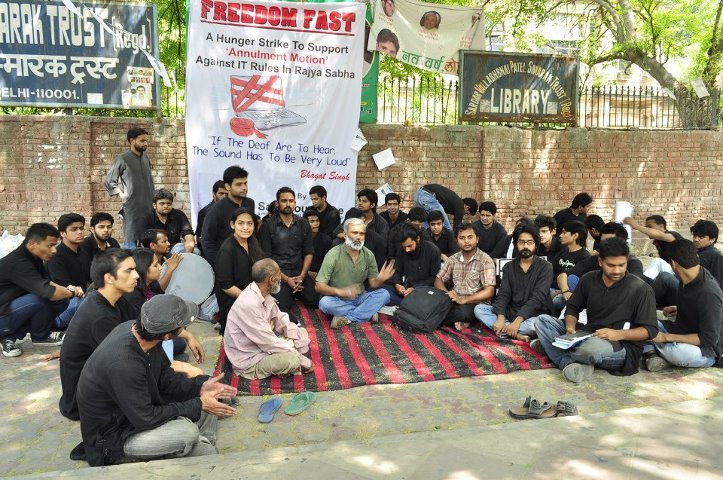 |
| Freedom Fast Hunger Strike And Sit in at Jantar Mantar, New Delhi, India. Image courtesy ‘I Love India' |
Arvind is against the implementation of the IT Act and says that internet, which is a source of expression of the common man, should be provided ‘free' and not be brought under any rules.
The mainstream media has been silent on these protests. Some lone voices can be seen on Twitter providing updates:
@rahulgaitonde: RT @nixxin: In case you weren't aware, there's a hunger strike at Jantar Mantar against the IT Rules http://t.co/6865MHhb
@saveyourvoice: Fifth day of FREEDOM FAST- Alok Dixit and Aseem Trivedi have been admitted to Dr. Ram Manohar Lohia Hospital, due to health breakdown.
Thumbnail image courtesy Save Your Voice
Subscribe to:
Comments (Atom)




























